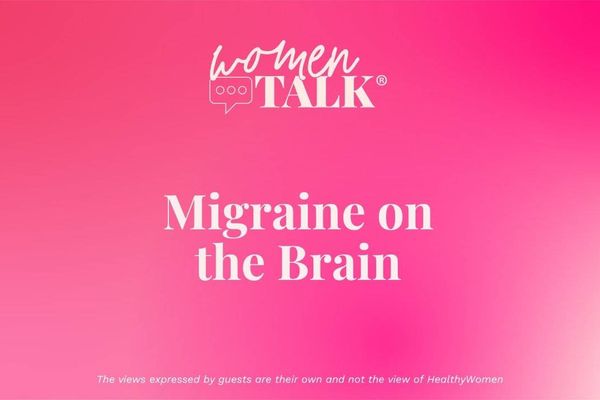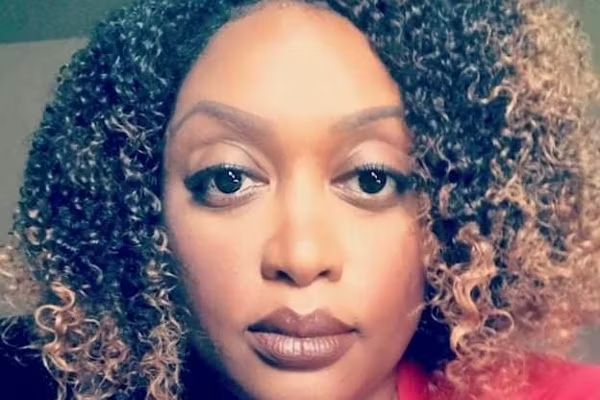I am a woman who lives with migraine, the disease that causes migraine headaches or migraine attacks.
It started when I was 25 years old. I was a first-year resident, fresh out of medical school and pregnant with my daughter. I have a vivid memory of having to walk past a coffee cart at the entrance of the hospital where I was doing my residency every single day. Just the smell of the coffee would set off a migraine attack.
That whole year is kind of a blur. The migraine attacks were debilitating, and I had a hard time functioning. Even now, I really like coffee, but if I have a bad migraine attack, I can't drink it; I can't even be near it. What's interesting is that the literature says that migraine gets better with pregnancy for two-thirds of women. That's because a lot of women have a hormonal relationship with migraine attacks, so the odds are in your favor. But my migraine attacks did not read the text book.
Most of the time, my migraine headaches come on gradually. There have been a few times when they've come on suddenly, but fortunately, those have been few and far between. I've never had the aura some people get with migraine, but smells, light and sound can all aggravate my headache pain.
My migraine attacks often tend to be on the right side of my head, and the pain can be throbbing and pulsating. Other times, my whole head will hurt, and I will have neck pain too. Sometimes I'll get nausea, but not always; it depends on the level of the pain intensity. The symptoms can last all day and into the next day. Sometimes I can have a more moderate level head pain for a few days, rather than the ones that debilitate me. I've been pretty fortunate, though, in that the severe ones have not been too frequent, and I've been able to manage them pretty well.
In addition to being a patient, I'm also a migraine specialist. I'm a fellowship-trained, board-certified headache neurologist, and my life's work is headache medicine.
I went into neurology because I love the brain. When I was in my neurology residency, I really loved the patients that I was taking care of who had migraine. It may sound strange, but I enjoy caring for patients who have headaches, either from migraine or from another cause. And because I experience migraine headaches myself, I think it makes me better able to care for my patients.
When patients tell me about their migraine postdrome (the hangover portion of a migraine) or about cognitive symptoms that accompany their migraine attacks, or other nonpain symptoms, I can empathize with what they're talking about because I've experienced it, too.
There's one more way I live with migraine: as a mother. When my 14-year-old daughter was about 10, we were driving in the car and she said, "You know, mom, anytime it gets really cloudy and starts to rain, my head just starts to pound like anything. Why is that?"
I couldn't believe it. My daughter was talking about the fact that weather changes affected her headaches. We went on to discuss this further, and I discovered she had migraine headaches. Then about a year ago, I started getting phone calls nearly every day from basketball practice that she was having a horrible migraine attack, and I needed to bring her home. Finally, I took her in to see her pediatrician, and we agreed to start her on medication. After that, my daughter said, "Mom, I feel so much better. My head used to pound the way the basketball pounds on the basketball court."
Her description of symptoms really hit me. She doesn't know what my patients are talking about; she doesn't know the way we describe migraine in a clinical setting, yet these are the same words that she was using.
Being the parent of someone who has migraine headaches really has impacted my life and made me think about this from an additional perspective I didn't have before — even though I'm somebody who has migraine myself and this is my life's work.
I have migraine attacks, so I know what that feels like. And I went to school for a very long time, where I learned about migraine, I teach people about migraine, I've written a lot about migraine, I take care of people with migraine. I thought I had it all figured out, but then when it started to affect my own child, that offered me a whole new perspective, rounding out my experience.
I'm really grateful for where I am. Yes, I'm somebody who has migraine headaches, but I get to use my personal experience to help others. And yes, my daughter also has migraine headaches, but I'm able to use my experience to help her — and I'm able to use her experience to help my patients. So it kind of all fits together like a puzzle.
Migraine is extremely common. In fact, about one out of four households in the U.S. has someone who experiences migraine attacks, and many physicians who treat migraine also have it themselves. The migraine community is quite strong and a lot of advocacy is happening — from political advocacy to get more funding to societal advocacy to help reduce the stigma. What I'm optimistic about is that we have new treatments in the pipeline, and hopefully that means the landscape of migraine will look much different in the next 10 to 20 years.
Sometimes people feel like they are alone with their migraine attacks, and I really want them to know that they're not.
Rashmi Halker Singh, M.D., is an associate professor of neurology, the headache fellowship program director at Mayo Clinic and a fellow of the American Headache Society.
This resource was created with support from the Allergan Foundation.
- A New Device Can Help Healthcare Providers Treat Migraine Attacks ›
- Self-Care for Migraine Attacks – You Don’t Have to Suffer ›
- A Perfect Storm Migraine Attack Revealed the Limits of My “Push Through the Pain” Philosophy - HealthyWomen ›
- I Finally Figured Out What Was Causing My Migraines - HealthyWomen ›
- Questions and Answers About Migraine Disease - HealthyWomen ›
- What To Do About Migraine at Work - HealthyWomen ›
- Got a Headache? Sometimes Less is More. - HealthyWomen ›
- Preguntas y respuestas relacionadas con el trastorno de migrañas - HealthyWomen ›
- Lo que debes hacer acerca de migrañas en el trabajo - HealthyWomen ›
- We Need to Raise Awareness of Migraines in the Workplace - HealthyWomen ›
- Migraine or Headache? Understanding the Difference - HealthyWomen ›
- How to Support a Loved One with a Migraine - HealthyWomen ›
- Cómo ayudar a un ser querido que tiene una migraña - HealthyWomen ›






